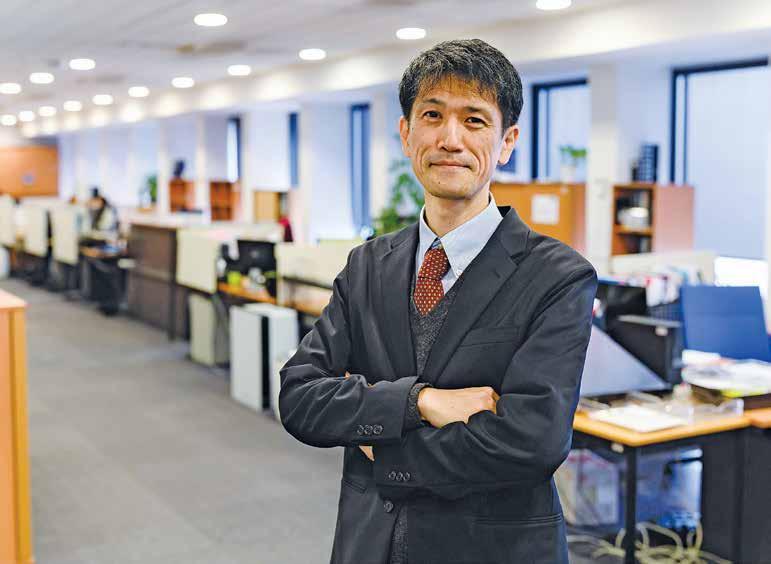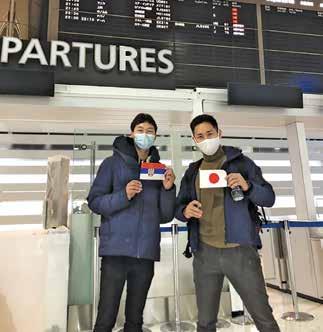
9 minute read
WE WISH TO DEEPEN OUR PARTNERSHIP
from Partner Japan 2021
We are looking forward to the moment when we will be able to meet face-to-face and continue working on our projects together with our Serbian partners. JICA provided a strong contribution to combating COVID-19 by providing medical equipment to hospitals in Belgrade, Novi Sad, Niš and Kragujevac.
Since the declaring of the pandemic, the JICA Balkan Office has prioritised the health of its office staff and their families. Therefore, following the recommendations of the Serbian government, shorter working hours and work from home were introduced. And a consequence of this was that communication was shifted to online meetings, first internally and then also with counterparts and partners. Although the same working style is still a must, JICA is now focused on activities that aim to solve the issues of partner countries. “It is so important that, through the activities, we also convey to our partner countries the Japanese working style and way of thinking and to gain their understanding,” says Jiro Takeichi, Chief Representative of the JICA Balkan Office. “Since we wish to deepen the partnership between Japan and Serbia through our mutual understanding, we are slightly concerned that real understanding cannot be achieved if there is no face-to-face contact. We are therefore looking forward to having the freedom of movement that existed before the pandemic, so that Serbian and Japanese people can meet face-to-face and continue working on projects together.”
Advertisement
Given your focus on public health and environment protection, and the aim of creating societies that are resilient to pandemics, which projects have you formulated with the Serbian government in the meantime? - Regarding the health sector, the Serbian government is taking serious measures to prevent diseases and had formulated public health policies before the pandemic. In order to contribute to these government policies, JICA previously provided medical equipment to hospitals in Belgrade, Novi Sad, Niš and Kragujevac. Moreover, JICA has also for many years provided assistance in improving the early detection of breast cancer by donating medical equipment and technical assistance. In this pandemic as well, JICA and the Serbian Ministry of Health are continuing their cooperation and there is a plan to strengthen the health system, provided we reach agreement.
On the other hand, in order to strengthen the resilience of the agricultural sector, we started a pilot project with the Ministry of Agriculture to improve the living standard of farmers. We focus on the fact that Serbian fruit is highly valued abroad, and that cultivating strawberries in greenhouses would increase the production output and they could be exported to the Japanese market, which further leads to increasing farmers’ income and improving their livelihood. This pilot project is implemented by Serbian company Master fruits, in partnership with Japanese company Itochu Corporation.
friendship between the two countries and that is the main goal of the volunteer programme. Volunteers aren’t only dispatched to Belgrade, but rather also to other Serbian towns, such as Jagodina and Kraljevo, where they assist local institutions in sporting activities, work with people with disabilities, in the disaster prevention sector, and also teach the Japanese language. The volunteer programme has gained popularity thanks to their activities. However, they suddenly had to return to Japan temporarily, due to the pandemic. Among them are volunteers whose assignment ended during their temporary return to Japan. They lost the possibility to come back to Serbia to continue with their activities. Others were eager to return to Serbia and continue their work. I would like to introduce two of them who returned to Serbia in December 2020. One of them is Mr Yuya Miyagi, who has been dispatched to the Belgrade Sports Association for Persons with Disabilities. In Serbia, where the social participation of persons with disabilities is still limited, he was kindly welcomed by colleagues and beneficiaries of the association, as he supported them in enjoying sporting activities and improving their quality of life. At the moment of his return to Serbia, he was almost at the end of his assignment, but he used the opportunity to wrap up his activities here and bid farewell to the members of the association. Another volunteer who returned recently is Mr Kazuki Yuji, who works at the Karate Club in Aranđelovac. The owner of Karate Club KNJAZ, one of the biggest karate halls in Serbia, expressed his wish to host a karate teacher from Japan who will convey We know that Japan Overseas We hope that the Kaizen system, which was the Japanese spirit of martial arts Cooperation Volunteers had to return to Japan after the outbreak born in Japan but has grown in the Western to the members of this karate club. Mr Yuji was therefore selected and of COVID-19. How many of them Balkans, will be used as a key to regional dispatched, as a suitable volunteer were dispatched to Serbia between the beginning of the program and March 2020, and what were their development and will become a brand of the Western Balkans who had Aranđelovac success in his previous work as a volunteer in another country. Mr Yuji will live in experiences? Aranđelovac and work at the Karate - At the moment the pandemic was declared, in March 2020, there were club until January 2022, so you might even meet him. While closely foleight volunteers in Serbia. The volunteer programme includes young lowing the pandemic situation, the JICA Balkan Office plans to continue and senior volunteers who are dispatched to Serbia and work together increasing the number of volunteers in Serbia. with their Serbian colleagues for two years, introducing the Japanese working style and Japanese way of thinking in order to familiarise them It was in August last year that you signed a very important project more with Japan. Furthermore, volunteers also disseminate their experi- related to the introduction of a sustainable and environmentally ences of Serbia in Japan and the Japanese people thus learn more about friendly public transport system in Belgrade. Can you please tell us Serbia. Achieving this mutual understanding leads to strengthening the more about the expected goals?

- Following the famous project ‘Japanac’ (yellow bus donation), we are proud to support the modernisation of public transport in Belgrade. As it is the main mode of transport in Belgrade (almost half of daily trips are by public transport, followed by private cars at 26% and walking at 24%), the new project will provide a direct positive impact on the quality of life in Belgrade. This project will tackle the issue of operation management based on a trip demand survey and its analysis, as well as financial sustainability by improving the fare collection system. Our expectation is to have an efficient and sustainable public transport system here in Belgrade.

Very successful long-term cooperation between the Development Agency of Serbia and JICA in the field of mentoring in the Western Balkans ended in 2020. How would you summarise this experience? - As they aim for accession to the EU, Western Balkan countries first need to strengthen their system in terms of economic revitalisation and the creation of employment, and to do this the key factor is the promotion of small and medium-sized enterprises (SMEs), as the main generators of domestic employment. For a long time, by focusing on dialogue with business owners, JICA has been supporting the establishment of a mentoring system that increases the productivity of SMEs. Mentoring services are not merely consulting services – rather they are considered as working alongside business owners and employees to help change their attitudes to business. In the meantime, about 200 mentors have been trained and 2,500 companies from this region have so far taken advantage of these mentoring services. Japan has amassed experiences in mentoring for many years, by diagnosing companies’ challenges. After interviewing the employees of a target company, mentors analyse the challenges they face by utilising the essence of KAIZEN and 5S. After more than 10 years of cooperation in this field, a mentoring service has been established in Serbia and the mentoring experience is now disseminated to other Western Balkan countries. We are very happy to know that our mentoring services are applicable in the Western Balkans and that our mentoring system is appreciated here. In order to generate the economic development of the whole region, we are now preparing to dispatch Japanese experts who will continue our cooperation. We hope that the mentoring system, which was born in Japan but has grown in the Western Balkans, will be used as a key to regional development and become a brand of the Western Balkans.
- The Knowledge Co-Creation Programme (KCCP) is system in which administrative officials and office workers from all around the world gather in Japan, take lectures in a specific professional field, such as environmental protection, healthcare, education etc., and prepare an action plan applicable for their countries. Japan is now a developed country, but the country was devastated after World War II ended and it was necessary to rebuild the social system. The history and experience of Japan, which arose from this situation and rebuilt its state, is used as knowhow in this programme. About 400 different KCCPs are organised in Japan every year, and many participants from Serbia have so far taken part. However, this programme has been hit hard by the pandemic. The recommendation was to organise KCCP courses online, if possible, and some of them have been rescheduled. However, we shouldn’t forget that the main purpose of the KCCPs is for participants to actually visit Japan and experience it for themselves. Moreover, it is a good opportunity for administrative officials from different countries to meet, spend some time together and establish a network. We hope that we will again welcome Serbian administrative officials to Japan as soon as the situation normalises. How satisfied are you with the impleMr Miyagi and Mr Yuji on their way back to Serbia in December 2020 mentation of other projects related to sustainable resource development? After the programme was halted in March - In April 2020, a project that covers the environment pollution caused by 2020, due to COVID-19, Japanese volunteers mining excavation and deals with the recently retuned to Serbia to share the issues of developing technology for rehabilitation of the environment, as Japanese working style and Japanese way of well as sustainable resource developthinking with Serbian citizens ment, was finalised after five years of implementation. The project location was the Bor mine. Work on scientific research to develop a modern technology was carried out jointly by the Mining and Metallurgy Institute Bor, the University of Belgrade Faculty of Mechanical Engineering and Akita University from Japan. Through this project, the level of pollution was evaluated using data gathered in the field and provided by satellite technology. The project also resulted in the development of complex technology for extracting gold particles from polluted soil. In summarising the result of this joint research, I would say that the researchers of all institutions involved worked with devotion to contribute to sustainable resource development and provided the final report to the Serbian government, as was planned. Moreover, by working on this project together, researchers from Serbia and Japan created a strong network and I am happy that this has nurtured one more generation of researchers. I also hope that the connection Based on your expectations, when and how will training resume within established between the researchers from our two countries will also the Knowledge Co-Creation Programme (KCCP) Group? continue to be a resource of each research institute in the future.










